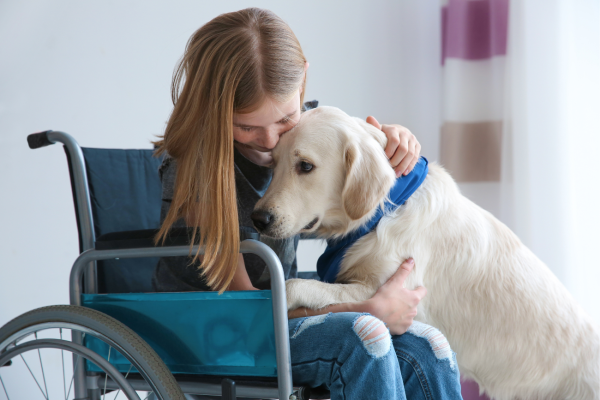 Adopting a service dog can be a life-changing and even lifesaving experience for a person with special needs. Service dogs can be trained to support people with disabilities in a variety of unique ways, such as:
Adopting a service dog can be a life-changing and even lifesaving experience for a person with special needs. Service dogs can be trained to support people with disabilities in a variety of unique ways, such as:
- Opening, closing, or even holding doors until the handler passes through them
- Retrieving dropped items
- Turning lights on and off
- Opening and closing cabinets
- Helping with dressing by tugging on clothes
- Laying across the chest of a handler in the midst of a seizure to help reduce the duration and keep the handler safe
- Retrieving medications or glucose kits
- Unloading groceries
- Putting laundry into the washer or dryer
- Alerting caretakers of a handler’s distress (unconsciousness, breathing difficulties, seizures)
- Calling 911 using a special K9 phone
- Providing mobility and momentum support when walking or transferring
While service dogs can provide a number of benefits and help improve one’s quality of life, the ownership of a support animal is not for everyone. It is a good idea for parents to take the following things into consideration when evaluating whether a service dog is right for their child with special needs:
- A service dog is not a pet. A service dog is trained to work and assist your child with activities of daily living. Allowing the service dog to bend the rules regarding his or her training (say allowing the dog to play at inappropriate times or sneak food from the table) could cause confusion and interfere with the dog’s ability to serve the child.
- Service dogs and emotional support animals are not the same thing. If you are more interested in finding a pet simply to provide your child with companionship, anxiety reduction, or general emotional support, then you should seek out an animal specifically trained for this purpose. Service dogs are animals who have very different skills and undergo rigorous training to perform tasks for the disabled. Be sure you are choosing an animal based on your real intentions and needs.
- How committed is the family to owning an animal? Owning a service dog is work for the handler as well, as he or she (or another family member) needs to be committed to feeding, grooming, and walking the dog, as well as providing veterinary care when required (annual shots, medication, sick visits). If you do not believe that your child is ready for such a responsibility, it may be best to consider other options.
Finally, obtaining a service dog is not as easy as it seems. There are often long waiting lists for animals trained to handle specific tasks, and the cost for a dog to undergo such training can range from $7,000-$30,000. Families should research whether or not they are eligible for grants through non-profits or other entities, and again, identify the specific type of service dog that’s desired so that you can get on an appropriate waiting list as soon as possible.
If you have additional questions about obtaining local resources for children with special needs, or you’re ready to start the process of creating a special needs plan, we invite you to contact our Brandon special needs lawyers at (813) 438-8503 to schedule an appointment.
